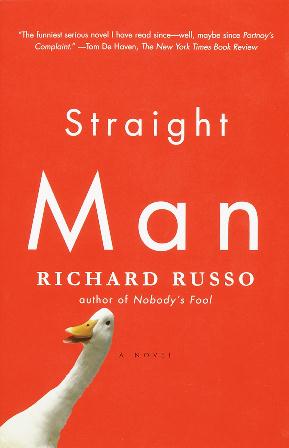Tune in to WAMD 970 AM on Thursday, October 20 at 7:30 a.m. to hear Susan Kelly talk about her review of “Straight Man” and more on The Morning Show with Maynard and Cindy
Youth is the season of deeds and old age is the season of grace. Unfortunately the transition between the two, the crossing from one season to the next, is where life gets especially treacherous. And if “ early promise” based on well-received deeds has not produced a second act, then the transition, the pushing to the next stage, can result in an emotional tailspin.
In Richard Russo’s novel “Straight Man,” early promise in the form of a moderately-received first novel is what has haunted the central character, Hank Devereaux Jr., all of his adult life. He finds himself in a mid-life quagmire, with early promise, unresolved hatred for his father’s philandering and the mistaken belief that he must continue to live his life with his adolescent mindset all parading as incisive wit.
Initially, riding the crest of his first novel, Hank embarked on adulthood reasonably well. He received a teaching job at a second-rate college, married the woman he loved and still loves, had children and maintained the same friends (coworkers) for 20 years.
Now his children are grown and on their own and he is the chair of the English department, but as he contemplates his fifth decade he knows the “early promise” has evaporated into the mist. Did he write another novel? No. Does he have any idea what his wife is thinking? No. Does he know the financial and emotional turmoil his daughter is in? No. Does he have any idea how to unite the divided English department? No, but he does know how to make fun of all of his coworkers and to view their fear of job loss as self-centered paranoia.
Hank’s inability to understand his coworkers comes to a head at a faculty meeting. He so enrages an instructor with a barrage of quips that are so relentless, unnecessary and irritating that she retaliates by throwing a spiral notebook at him with the wire spiral catching his nose and lodging itself there. It was a classic illustration of Kafka’s belief that in middle age one has the face one deserves. Hank deserves to have a cut nose that ballooned to an unsightly bulge, if perhaps just to humble him a bit.
To Hank, his coworkers are straights painfully caught in a trap of sameness, not understanding the joke that life is playing on them, and he points out their human frailties and foibles. Hank constructs the joke on them but, as the story unfolds, it is Hank who is suffering the brunt of the cosmic joke: he is not living an authentic life, he is just passing through clueless as to what it is he needs to make it more meaningful.
This book was humorous but not fluffy reading. Russo has a very heavy hand and the lack of subtlety hindered my enjoyment of the novel. Hank’s daughter spells out the problems in his marriage to him, pointing out that he and his wife actually jog in opposite directions even though they run at the same time. Coworkers converse frequently with him trying, to make him see their viewpoint; challenging him to take their careers seriously.
Also, a physical manifestation occurs during the week of his mid-life transition. Hank cannot go to the bathroom though he has the feeling of having to go constantly, and through self-diagnosis concludes he must have a stone. (Actually, it is a hysterical prostate problem bought on by stress). His life flow and urinary flow are both blocked and then humorously released after some over-the-top antics. I suggest that Russo might have let the reader discover the metaphors and let the protagonist discover his enlightenment. I like to engage my brain in my reading and if the novel is shouting the intrinsic ties, then it becomes a screenplay for a sitcom and more suitable for TV.
Richard Russo, an established successful writer, can write comedy, combined with insightful and surprisingly not powerful prose and there are scattered moments in the book where I laughed out loud, but the plot is certainly not original. In the movie “City Slickers,” for instance, Billy Crystal is a smart-aleck in a funk, both personally and professionally. When he experiences a cattle drive for a week, hilarity ensues as well as emotional growth, and Billy returns to the same life with a new attitude. He realizes that the most important thing, the singular element that makes his life worth living is his family. “Straight Man” is the same story, with an academic setting and, instead of Hank leaving, his wife leaves. Even the time allotment, one week, to change a life is the same. Both stories are funny with poignancy thrown in to deepen the effect.
It is a decent book, well-written, and the characters are believable—especially the coworkers in their academic milieu. If you enjoy the character, humor, and antics of Hank, it is time well spent. Danny Thomas once said, “There are no straight men anymore, everybody’s a comedian.” Hank is the comedian and his friends are his straight men and they became exhausted by their role.
As the novel closes, Hank acquires a mature grace, has renewed reverence for his friends, and develops a deeper relationship with his daughters. He has the same life with renewed attitude and he decides that, when jogging, he and his wife will run in the same direction.
The next book club pick is David Mamet’s “The Secret Knowledge,” a true story of how the successful playwright had a late-life conversion from liberalism to conservatism.




Leave a Reply
You must be logged in to post a comment.